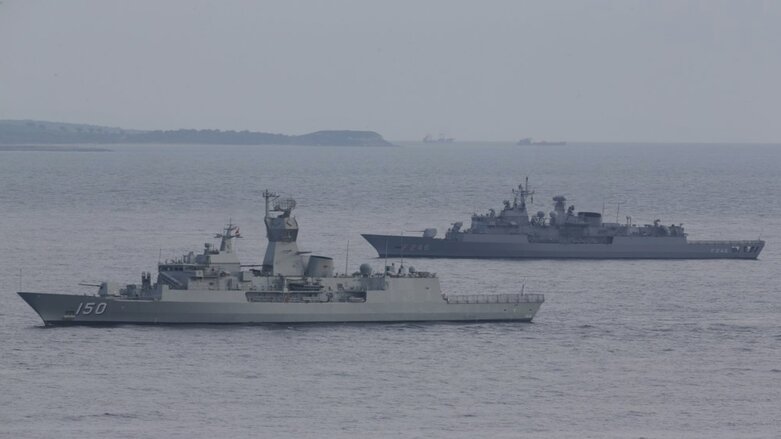Turkey says it will close straits to warships, as US welcomes decision

WASHINGTON DC (Kurdistan 24) – Following a meeting of the Turkish cabinet on Monday, Turkey’s Foreign Minister, Mevlut Cavusoglu, announced that Ankara would deny transit to warships through the Bosphorus and Dardanelles straits, under the 1936 Montreux Convention. Subsequently, Turkish President Recep Tayyip Erdogan confirmed that decision.
US Secretary of State Antony Blinken, who spoke with Cavusoglu on Monday about the Russian assault on Ukraine, warmly welcomed the decision.
Significance of the Montreux Convention
The Montreux Convention, when implemented, has the effect of cutting off a country’s naval fleet in the Black Sea from its warships in the Mediterranean, as it gives Turkey, in a time of war, the authority to deny transit through the Dardanelles and Bosphorus straits, which link the Mediterranean and Black Seas.
Russia has a Black Sea Fleet, with its main base is Sevastopol. It also has a major naval base in the eastern Mediterranean—in Tartus, Syria. Russian ships based in Tartus are part of the Black Sea Fleet. The implementation of the Montreux Convention would, in effect, cut the ships based in Tartus off from the rest of the Black Sea Fleet.
There are already a large number of Russian warships in the Black Sea. But as Reuters reported on Monday, at least four more Russian ships are waiting to cross the Dardanelles and Bosphorus straits from the Mediterranean into the Black Sea, according to Yoruk Isik, an Istanbul based geopolitical analyst and head of the Bosphorus Observer consultancy.
Two of those ships—a frigate and a destroyer—have formally requested to transit the straits, according to Isik and a senior Turkish official, Reuters said.
Two weeks ago, some 10 days before Moscow’s assault on Ukraine began, Russian Defense Minister Sergey Shoigu visited Russia’s air base in Syria and its naval base there, as Russia launched its largest maneuver exercise in the Mediterranean in 30 years.
The military exercise involved 15 warships and 30 aircraft.The Russian news agency, TASS, described Shoigu’s trip, along with the military maneuvers, as a "warning message" to the US and NATO.
Read More: Ukraine Crisis: Implications for the Middle East, including the US, Rojava, and the Kurdistan Region
Background to Turkish Decision on Montreux Convention
Prior to the current crisis, Ankara had cordial relations with Ukraine. Among several things, it provided Ukraine with weapons, including armed drones, which have now proven fairly effective in attacking the invading Russian forces.
On Saturday, Erdogan spoke with Ukrainian President Volodymyr Zelenskyy. After their conversation. Zelenskyy tweeted his country’s thanks for Turkey’s humanitarian and military support, while saying that a “ban on the passage of warships to the Black Sea” was extremely important.
That was not confirmed by any Turkish official. However, the next day, on Sunday, speaking to CNN Turk, Cavusoglu, referring to the Russian assault on Ukraine, asked, “Is this a conflict or a war?”
“This is a war,” he said, explaining the decision of the Turkish leadership. By declaring the situation a war, Cavusoglu established the underlying condition for the application of the Montreux Convention—i.e. a war exists.
However, Cavusoglu did not speak of blocking any ships. Rather, he noted an exception to the Montreux Convention: if a warship is returning to its home base, it can transit the straits.
It was only on Monday that the Turkish announcements on applying the Montreux Convention were made.
Fiollowing a meeting of the Turkish cabinet, Cavusoglu told journalists that all countries have been told not to send warships through the straits.
“When Turkey is not a belligerent in the conflict, it has the authority to restrict the passage of the warring states’ warships across the straits,” Cavusoglu said.
“If the warship is returning to its base in the Black Sea, the passage is not closed,” he continued. “We adhere to the Montreux rules. All governments, riparian and non-riparian, were warned not to send warships across the straits.”
Subsequently, Erdogan confirmed Cavusoglu’s statement, saying, “Turkey will use its authority over the Turkish Straits under the 1936 Montreux Convention to prevent the Russia-Ukraine crisis from further escalating.”
US Welcomes Decision
In his phone conversation with Cavusoglu on Monday, Secretary of State Antony Blinken “expressed his appreciation for Turkey’s continued implementation of the Montreux Convention” and Cavusoglu’s “recent comments on this issue,” according to a statement issued by State Department Spokesperson Ned Price.
Blinken “also thanked Turkey for its strong support in defense of Ukraine and its sovereignty and territorial integrity.”
However, Turkey has not yet prevented any warship from transiting the straits, and tangible results remain to be seen.
As Dr. Aykan Erdemir, a former Turkish parliamentarian and senior director of the Turkey Program at the Foundation for Defense of Democracies, advised Kurdistan 24, “Erdogan is beginning to wake up to the threat Putin poses.”
“However, given the Kremlin's enormous leverage over Ankara (which Erdogan helped build over the years),” Erdemir continued, “the Turkish president is having a difficult time ending his balancing act and siding openly with Ukraine.”
